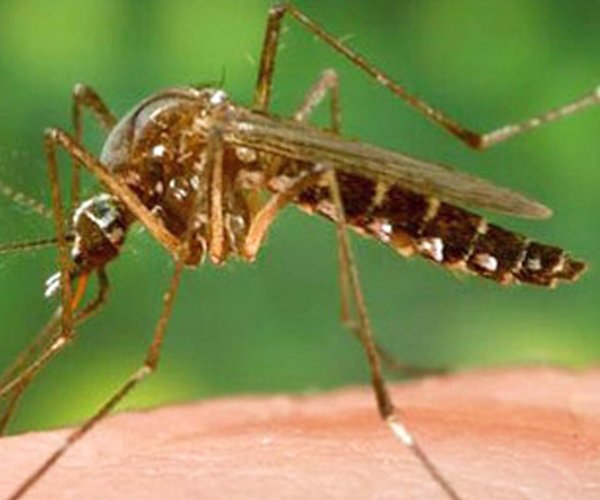As the weather takes a turn from pleasant days to sweltering, health officials are advising residents to get rid of any standing water that may remain to ward off a boon in mosquito breeding.
“As the rainy season comes to an end and temperatures rise, we will see increased mosquito activity,” said California Department of Public Health Director and State Public Health Officer Dr. Karen Smith. “Residents should dump out containers that hold standing water in and around their homes and businesses. Removing water will help reduce overall mosquito numbers and protect family members and neighbors from mosquito bites and mosquito-borne diseases.”
Mosquitoes breed in very small amounts of water. To help keep their numbers down, residents should frequently check for, and eliminate, water-filled containers, clean and scrub bird baths and pet watering dishes and dump water from dishes under potted plants. Residents are also urged to report unusual numbers of mosquitoes or day-biting mosquitoes to the Turlock Mosquito Abatement District.
The proactive steps are being urged as a method to tamp down outbreaks of West Nile Virus and the Zika Virus. Currently, there are no confirmed cases of Zika in California, however, there are seven counties that have reported West Nile Virus activity, including Kings County, which has the state’s first West Nile Virus case in a human.
As of May 12, there has been no confirmed West Nile Virus activity in Stanislaus County, but that won’t last for long. Turlock Mosquito Abatement District General Manager David Heft stated the region has seen an increased level of mosquito activity, mostly due to the rainy winter and spring. The irrigation season is likely to add to the problem, because for the first time in several years farmers will be getting the full allotment of water.
“Last year the irrigation allocation was 18 inches,” Heft stated previously. “This year it will be 48 inches. That alone would make for a bad year.”
Mosquitoes become infected with West Nile Virus when they feed on infected birds. Infected mosquitoes can then spread West Nile Virus to humans and other animals when they bite, according to the Centers for Disease Control.
Approximately one in five people who are infected with West Nile virus will develop symptoms such as fever, headache, body aches, joint pains, vomiting, diarrhea, or rash. Less than 1 percent will develop a serious neurologic illness such as encephalitis or meningitis (inflammation of the brain or surrounding tissues). About 10 percent of people who develop neurologic infection due to West Nile virus will die, according to the CDC. People over 50 years of age and those with certain medical conditions, such as cancer, diabetes, hypertension, kidney disease, and organ transplants, are at greater risk for serious illness.
There are no medications to treat or vaccines to prevent West Nile Virus infection. People with milder illnesses typically recover on their own, although symptoms may last for several weeks or months. In the neuroinvasive forms, patients can suffer severe and sometimes long-term symptoms.
Residents should also protect themselves from mosquito bites at home and while traveling to areas where the Zika virus is present. To prevent bites, consistently use mosquito repellent when outside, wear long sleeves and pants, use air conditioning, and make sure window screens will keep mosquitoes out of the home.
“It is particularly important for pregnant women and couples planning to become pregnant to prevent mosquito bites because Zika virus can cause miscarriage, stillbirth, and severe birth defects if a pregnant woman becomes infected,” said Smith.
Zika virus is spread primarily through mosquito bites and can also be transmitted by both men and women during sex. Most people who are infected with Zika virus do not experience any symptoms but should take precautions to avoid sexual transmission, even if they never had symptoms. Zika symptoms include fever, rash, joint pain and red eyes.
All individuals, particularly women of childbearing age, should take steps to protect themselves against mosquito bites while traveling and when they return home. Sexually active people who travel to areas with Zika virus transmission should use condoms or other barriers to avoid getting or passing Zika virus during sex. There has been no local transmission of Zika in California to date, but the mosquitoes that can carry Zika virus live in many areas of California.
Health officials urge residents to take the following precautions as the temperatures rise:
DEET – Apply insect repellent containing DEET, picaradin, oil of lemon eucalyptus or IR3535 according to label instructions. Repellents keep the mosquitoes from biting you. DEET can be used safely on infants and children 2 months of age and older.
DAWN AND DUSK – Mosquitoes bite in the early morning and evening so it is important to wear proper clothing and repellent if outside during these times. Make sure that your doors and windows have tight-fitting screens to keep out mosquitoes. Repair or replace screens with tears or holes.
DRAIN – Mosquitoes lay their eggs on standing water. Eliminate all sources of standing water on your property, including flower pots, old car tires, rain gutters and pet bowls. If you know of a swimming pool that is not being properly maintained, please contact your local mosquito and vector control agency.
Residents are urged to continue to report dead birds to the WNV State Hotline: 1-877-968-2473.
Reports may also be made online at www.westnile.ca.gov. Dead bird reports are an important tool for West Nile Virus detection, even if the bird is not picked up and tested. Lack of dead bird reports decreases the ability to detect higher risk locations. There are two mosquito abatement districts to serve residents in Stanislaus County. Residents north of the Tuolumne River contact the Eastside Mosquito Abatement District at (209) 522-4098. Residents south of the Tuolumne River should contact the Turlock Mosquito Abatement District at turlockmosquito.org or (209) 634-1234.





